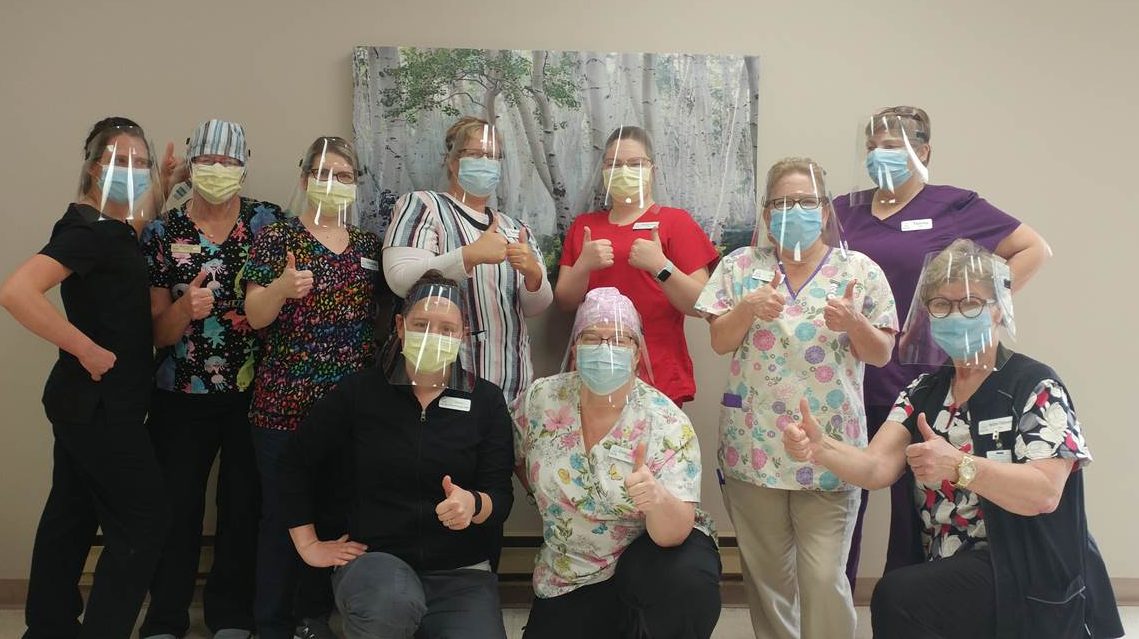An initiative launched by Western University to design and produce face shields for frontline medical workers amid the COVID-19 pandemic is getting some big support from General Dynamics Land Systems-Canada (GDLS-C).

University officials announced on Wednesday that the aerospace and defence contractor had agreed to help produce 500 face shields a day for the project, launched in late March in Western’s University Machine Services (UMS), an ancillary service based out of its engineering department.
Initially, a UMS team of about five or six people had been building the shields by shearing and forming polycarbonate, and then attaching them to 3D-printed Velcro fasteners.
With GDLS-C’s involvement, production will be almost double or triple what the smaller team could do on a daily basis, said Peter White, Western’s executive director of government relations and strategic partnerships.
With continuing concerns over personal protective equipment, and thousands of requests for the shields coming from across Canada and even from the U.S., White says those on the project realized a new style of production was needed that was beyond simple 3D printing.
“What we looked at was a different process. We started doing more of a specialized plastic, and we could put that together for doing a full scale production,” White said in an interview Wednesday with 980 CFPL’s Jess Brady.
“General Dynamics basically set up a whole line in conjunction with what we’re doing at Western so that we could really start meeting the demand,” he added.
“To have General Dynamics step in and help us with that, it was just phenomenal because there wouldn’t have been an ability for us at Western to be able to meet that level of demand.”
More than 11,000 face shields have been ordered since production began in April, with 8,000 already distributed by GDLS-C and the university at no cost to hospitals in London, St. Thomas, Woodstock, and Stratford, as well as to smaller regional centres, long-term care homes, and to paramedics.
“We were looking for a natural fit to contribute in a positive way here in Canada and abroad during this global pandemic,” said John Ellison, GDLS-C’s VP and general manager, in a statement.
“When we learned what Western was doing with medical face shields, we wanted to connect right away because it was a great idea and we knew we could help.”
According to Western, GDLS-C says it may further expand production of the shields if the demand is there.
- Shoppers faces proposed class action over claims company is ‘abusive’ to pharmacists
- ‘Bacterial vampirism’: Deadly pathogens attracted to human blood, study finds
- Most Canadian youth visit dentists, but lack of insurance a barrier
- Landmark smoking ban that would phase out sales passes U.K. parliament
Because the shields are made of a special polycarbonate plastic, White says frontline workers will be able to reclean them multiple times with a bleach solution or with CaviWipes, a disinfectant towelette used in medical centres, without degrading the plastic.
As part of the initial design, UMS Manager Clayton Cook collaborated with Western’s Dean of Engineering, Dr. Ken Coley, as well as senior academic and clinical leaders at Western’s Schulich School of Medicine and Dentistry to make sure the masks met hospital standards.
“A lot of the face shields that are used today in frontline service generally have a small elastic strap, not unlike what you’d see in a surgical mask. By using the Velcro straps… it allows the shields to last a lot longer,” White said.
“One of the pieces of feedback we’ve had is that the teams have said it lasts, it stands up. It’s worked very, very well.”
Health care providers looking to order shields are being asked to contact Lee Smithson, AMC (Advanced Manufacturing Consortium) Western’s Business Development Lead, at lee@westernamc.ca.
Questions about COVID-19? Here are some things you need to know:
Health officials caution against all international travel. Returning travellers are legally obligated to self-isolate for 14 days, beginning March 26, in case they develop symptoms and to prevent spreading the virus to others. Some provinces and territories have also implemented additional recommendations or enforcement measures to ensure those returning to the area self-isolate.
Symptoms can include fever, cough and difficulty breathing — very similar to a cold or flu. Some people can develop a more severe illness. People most at risk of this include older adults and people with severe chronic medical conditions like heart, lung or kidney disease. If you develop symptoms, contact public health authorities.
To prevent the virus from spreading, experts recommend frequent handwashing and coughing into your sleeve. They also recommend minimizing contact with others, staying home as much as possible and maintaining a distance of two metres from other people if you go out.
For full COVID-19 coverage from Global News, click here.









Comments